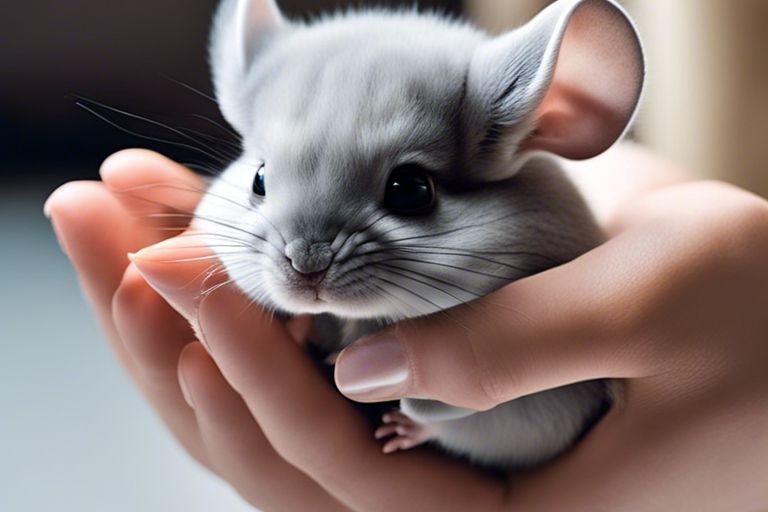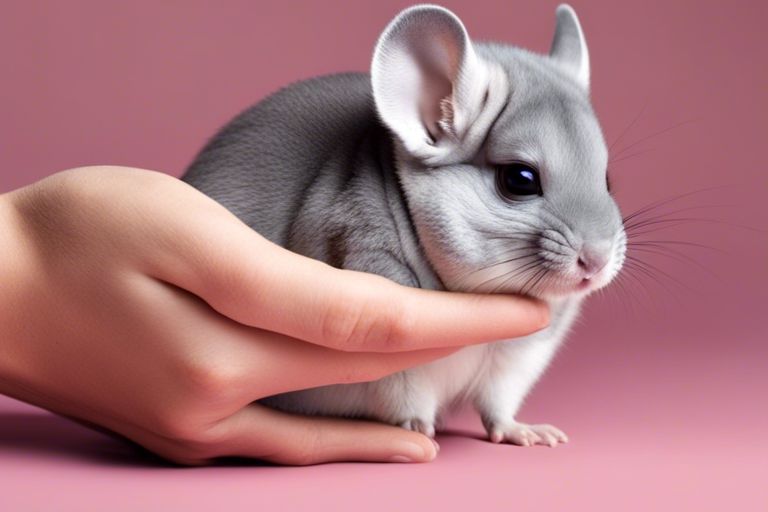Many new chinchilla owners find themselves wondering how to properly care for baby chinchillas, and this guide aims to provide crucial information on the topic. Proper handling, feeding, and housing are crucial elements to ensure the health and well-being of these delicate creatures. From creating a safe environment to offering a balanced diet, every aspect of caring for baby chinchillas is important to consider. Understanding the dangers of improper handling or nutrition is vital in raising healthy chinchillas. With the right knowledge and care, you can give these adorable pets the best start in life.
Key Takeaways:
- Socialization is crucial: Baby chinchillas need plenty of social interaction to grow up healthy and happy. Spend time handling and playing with them daily.
- Provide a proper diet: Ensure your baby chinchilla has access to fresh hay, pellets, and water at all times. Offer treats like raisins or dried fruit sparingly.
- Maintain a clean environment: Keep your chinchilla’s cage clean by regularly removing soiled bedding and providing a dust bath for them to keep their fur clean and healthy.
Setting Up a Safe Environment
Choosing the Right Cage
Right from the start, providing a spacious and secure cage for your baby chinchillas is imperative. Opt for a cage that is specifically designed for chinchillas, with narrow wire spacing to prevent escapes or injuries. Make sure the cage has multiple levels and platforms for exercise and exploration.
Safe Bedding and Accessories
Right bedding and accessories are crucial for your baby chinchillas’ safety and comfort. Avoid using cedar or pine shavings, as they can be harmful to chinchillas’ respiratory systems. Instead, opt for dust-free paper-based bedding or fleece liners. Provide safe accessories such as chew toys and wooden platforms to prevent boredom and encourage natural behaviors.
This will ensure that your baby chinchillas have a cozy and stimulating environment while minimizing any risks to their health and well-being. Keep in mind, a safe and enriching habitat is key to raising happy and healthy baby chinchillas.
Nutrition and Feeding
Feeding Baby Chinchillas
Little chinchillas have delicate digestive systems that require special care when it comes to feeding. For baby chinchillas, their diet should consist mainly of hay and pellets specifically formulated for young chinchillas. It’s crucial to provide them with fresh water at all times to keep them hydrated.
Essential Nutrients and Diet Supplements
The nutrients that are necessary for adult chinchillas are equally important for baby chinchillas. A balanced diet for your young chinchilla should include a mix of high-quality hay, pellets, and occasional treats like dried fruits or vegetables. Supplements are generally not necessary if you are providing a well-rounded diet, but be mindful of their calcium intake to prevent certain health issues like bladder stones.
Plus, overfeeding or providing the wrong foods can lead to digestive problems and obesity in baby chinchillas. It’s important to monitor their diet carefully and provide the necessary nutrients to support their growth and development.
Health and Hygiene
Regular Health Check-Ups
One important aspect of taking care of baby chinchillas is scheduling regular health check-ups with a qualified veterinarian. It is crucial to ensure that your chinchilla is in good health and to address any potential issues early on. During these check-ups, the vet can assess your chinchilla’s overall well-being, provide necessary vaccinations, and offer guidance on proper nutrition and care.
Maintaining Cleanliness and Preventing Diseases
To maintain the health of your baby chinchilla, it is imperative to keep their environment clean and hygienic. Regularly clean their cage, bedding, food and water containers, and toys. Avoid using cedar or pine shavings, as they can be harmful to chinchillas. Additionally, make sure to monitor your chinchilla for any signs of illness, such as a change in appetite, behavior, or appearance.
Another crucial aspect of preventing diseases in baby chinchillas is providing them with a balanced diet rich in hay, fresh vegetables, and specially formulated chinchilla pellets. Avoid giving them sugary treats or foods that are high in fat. Ensure that your chinchilla has access to fresh water at all times and avoid placing their cage in a drafty or excessively warm area.

Socialization and Handling
How to Handle Baby Chinchillas
Many new chinchilla owners wonder how to properly handle their baby chinchillas. It’s important to approach them with care and gentleness to avoid causing stress or injury. To pick up a baby chinchilla, gently scoop them up using both hands to support their body and ensure they feel secure. Avoid gripping them too tightly or squeezing them, as their delicate bones can easily break. Allow them to explore and get comfortable with your touch before attempting to hold them for extended periods.
The Importance of Social Interaction
An important aspect of caring for baby chinchillas is providing regular social interaction to help them develop trust and bond with their human owners. Chinchillas are social animals that thrive on companionship, whether it’s from their fellow chinchillas or their human caregivers. Regular handling and interaction will help acclimate them to human touch and build a strong relationship based on trust and security.
Interaction with your baby chinchillas will not only help them feel more comfortable around you but also make them more friendly and sociable pets as they grow older. Regular handling and socialization will also aid in preventing stress-related behaviors and promote a happy and healthy environment for your chinchilla.
Conclusion
To wrap up, taking care of baby chinchillas requires attention to detail and a gentle touch. By providing a comfortable environment, a nutritious diet, regular socialization, and proper veterinary care, you can ensure the health and well-being of your young chinchillas. Remember to handle them with care, monitor their growth and development, and seek guidance from experienced breeders or veterinarians when needed. With proper care and attention, your baby chinchillas will thrive and grow into happy and healthy adults.
FAQ
Q: What should I feed my baby chinchilla?
A: Baby chinchillas should be fed a diet consisting of high-quality chinchilla pellets, fresh hay, and occasional treats such as dried fruits. It is important to provide them with fresh water at all times and avoid feeding them foods that are high in fats or sugars.
Q: How do I create a safe environment for my baby chinchilla?
A: To ensure the safety of your baby chinchilla, make sure their cage is escape-proof with no gaps or openings they can squeeze through. Provide them with plenty of toys for mental stimulation and exercise, and avoid placing their cage in direct sunlight or drafty areas. Monitor the temperature in their environment to keep it between 60-70 degrees Fahrenheit.
Q: How do I socialize and handle my baby chinchilla?
A: Socializing your baby chinchilla is important for their mental and emotional well-being. Handle them gently and regularly to get them used to human interaction, but be mindful of their delicate bones and avoid rough handling. Allow them to explore their environment under supervision to build their confidence and trust with you.
